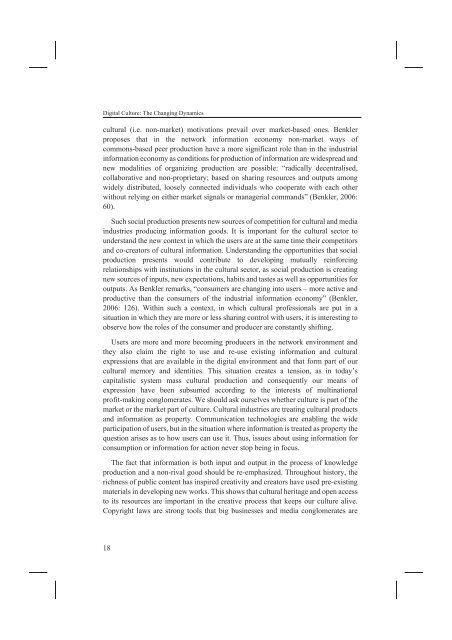D:\Documents and Settings\Ana\My Documents\Biserka-knjiga ...
D:\Documents and Settings\Ana\My Documents\Biserka-knjiga ...
D:\Documents and Settings\Ana\My Documents\Biserka-knjiga ...
You also want an ePaper? Increase the reach of your titles
YUMPU automatically turns print PDFs into web optimized ePapers that Google loves.
Digital Culture: The Changing Dynamics<br />
cultural (i.e. non-market) motivations prevail over market-based ones. Benkler<br />
proposes that in the network information economy non-market ways of<br />
commons-based peer production have a more significant role than in the industrial<br />
information economy as conditions for production of information are widespread <strong>and</strong><br />
new modalities of organizing production are possible: “radically decentralised,<br />
collaborative <strong>and</strong> non-proprietary; based on sharing resources <strong>and</strong> outputs among<br />
widely distributed, loosely connected individuals who cooperate with each other<br />
without relying on either market signals or managerial comm<strong>and</strong>s” (Benkler, 2006:<br />
60).<br />
Such social production presents new sources of competition for cultural <strong>and</strong> media<br />
industries producing information goods. It is important for the cultural sector to<br />
underst<strong>and</strong> the new context in which the users are at the same time their competitors<br />
<strong>and</strong> co-creators of cultural information. Underst<strong>and</strong>ing the opportunities that social<br />
production presents would contribute to developing mutually reinforcing<br />
relationships with institutions in the cultural sector, as social production is creating<br />
new sources of inputs, new expectations, habits <strong>and</strong> tastes as well as opportunities for<br />
outputs. As Benkler remarks, “consumers are changing into users – more active <strong>and</strong><br />
productive than the consumers of the industrial information economy” (Benkler,<br />
2006: 126). Within such a context, in which cultural professionals are put in a<br />
situation in which they are more or less sharing control with users, it is interesting to<br />
observe how the roles of the consumer <strong>and</strong> producer are constantly shifting.<br />
Users are more <strong>and</strong> more becoming producers in the network environment <strong>and</strong><br />
they also claim the right to use <strong>and</strong> re-use existing information <strong>and</strong> cultural<br />
expressions that are available in the digital environment <strong>and</strong> that form part of our<br />
cultural memory <strong>and</strong> identities. This situation creates a tension, as in today’s<br />
capitalistic system mass cultural production <strong>and</strong> consequently our means of<br />
expression have been subsumed according to the interests of multinational<br />
profit-making conglomerates. We should ask ourselves whether culture is part of the<br />
market or the market part of culture. Cultural industries are treating cultural products<br />
<strong>and</strong> information as property. Communication technologies are enabling the wide<br />
participation of users, but in the situation where information is treated as property the<br />
question arises as to how users can use it. Thus, issues about using information for<br />
consumption or information for action never stop being in focus.<br />
The fact that information is both input <strong>and</strong> output in the process of knowledge<br />
production <strong>and</strong> a non-rival good should be re-emphasized. Throughout history, the<br />
richness of public content has inspired creativity <strong>and</strong> creators have used pre-existing<br />
materials in developing new works. This shows that cultural heritage <strong>and</strong> open access<br />
to its resources are important in the creative process that keeps our culture alive.<br />
Copyright laws are strong tools that big businesses <strong>and</strong> media conglomerates are<br />
18



